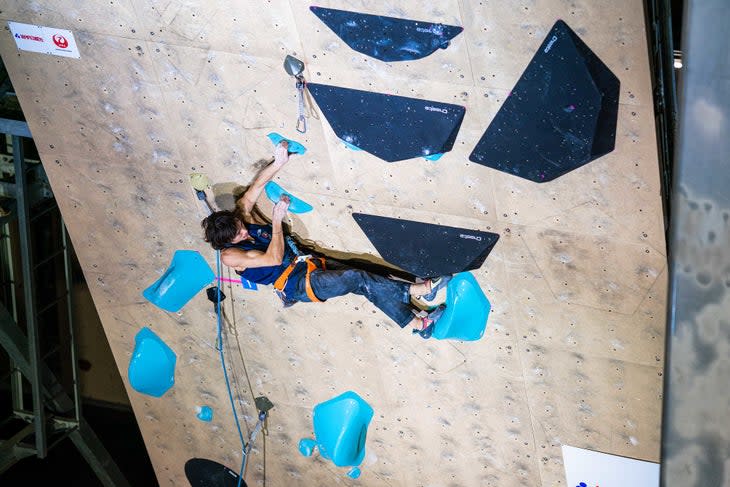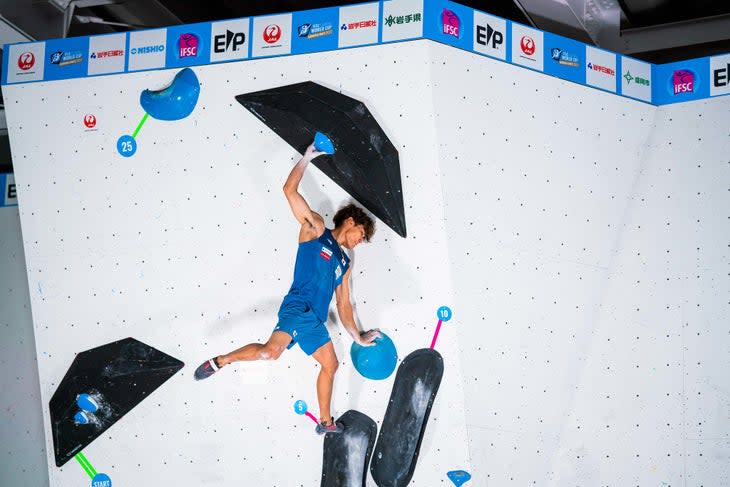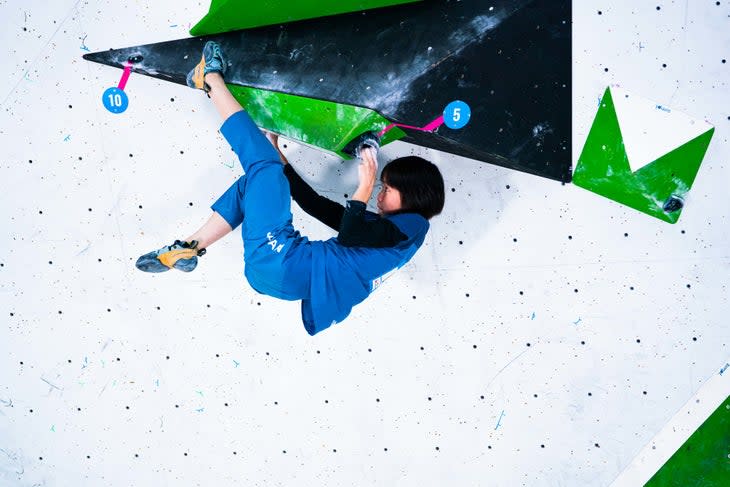Combined World Cup Provides an Olympic Sneak Peek. Grossman and Mori Engage in an Epic Battle. Results.
- Oops!Something went wrong.Please try again later.
- Oops!Something went wrong.Please try again later.
- Oops!Something went wrong.Please try again later.
- Oops!Something went wrong.Please try again later.
This article originally appeared on Climbing
Just when it felt like all the weirdness and storylines for the 2022 World Cup season had concluded--with the overall titles awarded and all eyes peering towards next year--the IFSC punctuated the 2022 season with a one-off Combined World Cup in Morioka, Japan this weekend. Unique to the World Cup circuit, the Combined event featured a melding of boulder and lead disciplines in preparation for the 2024 Paris Olympics' format (which will also feature Speed as a separate medal discipline).
More specifically, the scoring for this Combined World Cup in Morioka was based on a maximum score of 200 points (100 for the boulder discipline and 100 for the lead discipline). The scoring methodology deviated considerably from the usual ways of scoring the boulder and lead disciplines. For example, rather than the typical singular zone hold, boulders at this
Combined event featured several zone holds worth 5 points, 10 points, and finally 25 points for the top hold; competitors' scores decreased by fractions of points with each unsuccessful attempt. Scoring for the lead discipline was also segmented, with the holds on the highest section of the wall worth 4 points apiece, holds in the section below that worth 3 points apiece, and so forth in descending order down the wall.
If you're feeling a bit confused by all those point designations, you're not alone--it's not the most intuitive scoring system (especially for casual fans). But fortunately the complicated tallying did not detract too much from the excitement and fans were given a glimpse of what might be in store for those aforementioned Paris Olympics two years from now.
Here's how things shook out...
A huge win for the home team
Team USA's Sean Bailey had mixed results throughout much of the 22 World Cup season (as high as third place at a lead World Cup in Chamonix and as low as 47th at a boulder World Cup in Meiringen). But he surged to the top of the men's leaderboard in the early stages of this Combined World Cup, amassing 79.1 points in the qualification round of the boulder portion and 84.1 points in the qualification round of the lead portion, for a total score of 163.2 out of 200. (One of the downsides of this current combined scoring system is that peculiar decimal scores are practically unavoidable.)
Bailey struggled on the first boulder of the semi-finals, a rightward progression on small slopers, whereas competitors such as Great Britain's Toby Roberts, Germany's Yannick Flohe, France's Paul Jenft, and a trio from Team Japan (Tomoa Narasaki, Yoshiyuki Ogata, Taisei Homma) shined on it. Bailey did secure tops on the next two boulders to stay in the mix, but Narasaki, in particular, continued to look nearly unstoppable. In fact, Narasaki closed out the boulder portion of the semi-finals by topping all four blocs. Bailey battled back by notching the high point in the successive lead portion, but it was evident that Team Japan possessed the most depth as Narasaki, Ogata, Homma, Kokoro Fujii and Rei Kawamata all cruised into the final round alongside Bailey, Jenft, and Flohe.

The unequivocal standouts in the boulder portion of the men's final round were Jenft and Narasaki, each of whom topped three of the four boulders--including the savage second boulder, a "refrigerator compression" sequence up an arete. At the close of the bouldering portion, Jenft and Narasaki were separated by only 0.4 points. But a prolonged struggle working out of a stacked kneebar in the ensuing lead portion proved costly for Jenft, who finished the final round with a total score of 129.7 and barely missed out on a podium spot. Bailey climbed three moves higher on the lead wall, but his total score of 76.6 was not enough to vault him to a podium position either.
In the end, the standout in the final round's lead portion was Ogata, who fell only when his feet cut as he neared the top of the wall. Narasaki climbed last and fell much lower while trying to secure a left-handed undercling on a jib, but his combined score of 156.4 (incorporating the points from his stellar boulder round) proved enough to surpass Ogata's total of 138.4. Thus, Narasaki won the gold medal; Ogata earned the silver medal, and Fujii (with 132.6 points) earned the bronze--a podium sweep for Team Japan on home soil.

An unforgettable finish
Even prior to the start of the Combined event, much of the intrigue in the women's division revolved around a potential showdown between the overall boulder season winner, USA's Natalia Grossman, and the star of the final events of the lead season, Japan's Ai Mori. And with Slovenia's Janja Garnbret on holiday and absent from the Morioka Combined World Cup altogether, Grossman and Mori quickly became the event's early favorites.
Mori gained the initial edge, aided greatly by a perfect score of 100 in the lead portion to reign supreme in the qualification round (with a total score of 183.2 points). But Grossman was not far behind, situated in second place with 160.8 points, and other challengers such as France's Oriane Bertone, South Korea's Chaehyun Seo, and Japan's Miho Nonaka were also in top form. Nonaka, for instance, briefly led the ensuing semi-final round after topping the first boulder, but Grossman, along with seven other competitors (including Mori) quickly topped it too. Grossman continued cruising and eventually found herself in first place at the close of the boulder portion--several spots higher than Mori. However, Mori soon became the only competitor to reach the top of the semi-finals lead route and vaulted right back into the leader position on the scorecards.
None of this is to imply that other challengers were not capable of spoiling the party that felt tailor-made for Grossman and Mori. Team USA's Brooke Raboutou seemed to be in a good rhythm the whole weekend, ultimately placing fourth in the semi-finals and bringing several boulder attempts down to the wire in the finals before timing out. Chaehyun Seo also stood out in the boulder portion of the finals, reaching the top of the run-and-jump slab that kicked off the proceedings, and also securing a top on the shouldery third boulder of the climactic round.
But despite some periodic pressure from other competitors, Grossman and Mori continued to excel, being the only two women to top all four boulders in the finals (separated by just 0.3 points). The aforementioned Seo set an early high point in the final round's lead portion, climbing deep into the upper reaches of green pyramid-shaped volumes before falling with a lead score of 72 out of 100. Moments later, Raboutou cut feet in the same section, yet held a wide grip just long enough to earn the same score.
Finally, the final round came down to the predicted pairing of Grossman vs. Mori. Grossman journeyed through the route's lower sections, a progression of yellow and blue pinches and a series of red dish volumes, before reaching the section of green holds that had bested Seo and Raboutou. Grossman then locked in a heel on one of the section's long, pyramid-shaped volumes and attempted unsuccessfully to reach statically for a right-hand crimp; her lead score of 72.1 stood briefly as a new high point, until Mori pulled onto the wall, voyaged to the same upper section, and stuck that cruxy right-hand crimp. Mori fell a few moves higher, having already secured the gold medal with a total score of 190.0. Grossman's total score of 171.2 earned the silver medal, and Seo's 131.8 was good for the bronze.

In some ways, the Paris Olympics in the summer of 2024 feel far away, yet this Combined event gave the best preview of which athletes could shine. At the risk of overlooking younger athletes that might burst onto the adult scene in the coming two years, fans should consider Mori, Grossman, Seo, and Raboutou (and Janja Garnbret, of course) to be big favorites in the women's division for Paris 2024 qualification at this juncture, and Narasaki, Ogata, Fujii, Jenft, and Flohe to be among the favorites in the men's division. But anything can happen, and there's no telling who might shine brightest in the coming World Cup season.
Results
Men
Tomoa Narasaki (JPN)
Yoshiyuki Ogata (JPN)
Kokoro Fujii (JPN)
Paul Jenft (FRA)
Yannick Flohe (GER)
Taisei Homma (JPN)
Rei Kawamata (JPN)
Sean Bailey (USA)
Women
Ai Mori (JPN)
Natalia Grossman (USA)
Chaehyun Seo (KOR)
Brooke Raboutou (USA)
Miho Nonaka (JPN)
Natsuki Tanii (JPN)
Futaba Ito (JPN)
Mia Krampl (SLO)
Also Read
For exclusive access to all of our fitness, gear, adventure, and travel stories, plus discounts on trips, events, and gear, sign up for Outside+ today.


